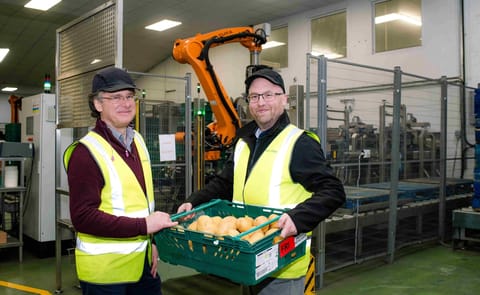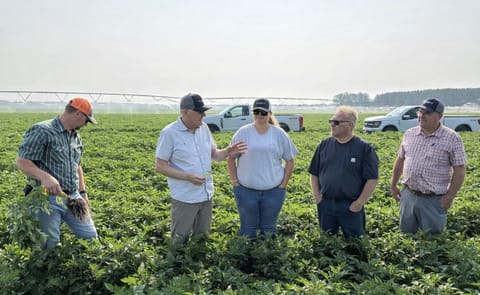Potato-LITE: Delivering novel, sustainable cultivation approaches to minimise tillage intensity throughout the UK
Primaire tabs
Potato-LITE: Delivering novel, sustainable cultivation approaches to minimise tillage intensity throughout the UK

Defra and UKRI, as part of the Farming Innovation Programme, recently announced funding for 'Potato-LITE' – a multimillion pound project over four years, that will develop novel machinery and cultivation practices for UK-based potato farms to minimise tillage intensity, improve soil health and lower greenhouse gas emissions (GHG).
This project will be delivered by a cross-industry consortium led by PepsiCo in partnership with McCain Foods GB Ltd, GRIMME UK Ltd, Crop Health and Protection (CHAP), Cranfield University, Harper Adams University; and farmers from Strawson Limited, JRO Griffiths Ltd, JM Bubb & Son and H Sutton & Son.
Revolutionizing Potato Farming Practices: Reducing Tillage Intensity and Greenhouse Gas Emissions
Tillage is considered one of the largest drivers of GHG emissions after fertiliser use, making this a critical area for improvement. Current potato tillage operations can lead to loss of soil organic carbon into the atmosphere as carbon dioxide (CO2).
Global research has shown that the loss of soil carbon can reduce soil productivity, which can increase the need for fertiliser inputs and reduce farm profits – making the investment in low intensity tillage solutions more important than ever.
Tillage is considered one of the largest drivers of GHG emissions after fertiliser use, making this a critical area for improvement. Current potato tillage operations can lead to loss of soil organic carbon into the atmosphere as carbon dioxide (CO2).
Global research has shown that the loss of soil carbon can reduce soil productivity, which can increase the need for fertiliser inputs and reduce farm profits – making the investment in low intensity tillage solutions more important than ever.
Mac McWilliam, R&D Director of Agricultural Science at PepsiCo:
Alex McCormack, Innovation Technical Lead at CHAP:
Embracing Regenerative Agriculture: Innovating Towards Sustainable Potato Production in the UK
Ed Hodson, Potato Product Specialist at GRIMME UK:
Ed Hodson:
Mark Strawson, Managing Director at Strawson Limited:
This project will be delivered by a cross-industry consortium led by PepsiCo in partnership with McCain Foods GB Ltd, GRIMME UK Ltd, Crop Health and Protection (CHAP), Cranfield University, Harper Adams University; and farmers from Strawson Limited, JRO Griffiths Ltd, JM Bubb & Son and H Sutton & Son.
Revolutionizing Potato Farming Practices: Reducing Tillage Intensity and Greenhouse Gas Emissions
Tillage is considered one of the largest drivers of GHG emissions after fertiliser use, making this a critical area for improvement. Current potato tillage operations can lead to loss of soil organic carbon into the atmosphere as carbon dioxide (CO2).
Global research has shown that the loss of soil carbon can reduce soil productivity, which can increase the need for fertiliser inputs and reduce farm profits – making the investment in low intensity tillage solutions more important than ever.
Tillage is considered one of the largest drivers of GHG emissions after fertiliser use, making this a critical area for improvement. Current potato tillage operations can lead to loss of soil organic carbon into the atmosphere as carbon dioxide (CO2).
Global research has shown that the loss of soil carbon can reduce soil productivity, which can increase the need for fertiliser inputs and reduce farm profits – making the investment in low intensity tillage solutions more important than ever.
Mac McWilliam, R&D Director of Agricultural Science at PepsiCo:
"Agriculture is at the heart of PepsiCo, including our Walkers brand in the UK. As a business, we’re deeply committed to developing scientifically validated solutions which will enable us to make progress towards our global PepsiCo Positive (pep+) goal of spreading regenerative farming practices across 7 million acres by 2030."Collaborating for a Net Zero Future: Industry Leaders Unite to Transform Potato Cultivation
"The Potato-LITE project will help us drive this positive action by transforming potato cultivation and improving soil health whilst reducing greenhouse gas emissions. We are delighted to be working in partnership across the supply chain, including our growers, as we work towards a net zero future."
Alex McCormack, Innovation Technical Lead at CHAP:
"Working alongside our public-sector partners and leading experts from Harper Adams University and Cranfield University, will enable us to better understand the impact of intensive cultivation operations seen in potato and root crops."Potato-LITE is scheduled to begin in Spring 2023, where experimental commercial-scale low intensity tillage approaches will be trialled by partner UK growers, with performance and commercial viability validated by the consortium. These efforts will help uncover new low intensity tillage solutions for the potato farming industry whilst quantifying the effects on soil health and GHG emissions against current best practice methods.
"This project aims to mitigate the negative effects on soil health, reduce GHG emissions linked to production and enable the sector to transition towards regenerative practices."
Embracing Regenerative Agriculture: Innovating Towards Sustainable Potato Production in the UK
Ed Hodson, Potato Product Specialist at GRIMME UK:
"We are very excited to start the Potato-LITE project which is vital to help set the direction of potato production techniques for the near future."Innovative equipment and processes are needed to move forwards as UK production has reached a plateau. This project will bring new solutions to deliver commercial and environmental benefits through reducing the intensity of cultivations.
Ed Hodson:
"Growers will also be provided with the tools to make informed field by field decisions to identify the best process of growing potatoes, resulting in environmental benefits but also cost savings, labour reductions and improved work rates."Potato-LITE: Spearheading Climate-Resilient and Cost-Effective Potato Farming Techniques As Potato-LITE kicks off in Shropshire, the consortium looks forward to making progress against its shared goal of developing an improved potato sector across Britain where farmers prove the financial and climate benefits of embracing low intensity tillage solutions.
Mark Strawson, Managing Director at Strawson Limited:
"We are working hard on implementing regenerative farming practices to improve soil health. Currently, potato cultivation is a heavy process, with significant volumes of soil being moved to bury stones and clods to establish a friable seed bed."James Young, Vice President of Agriculture at McCain GB & Ireland:
"Climate change disruptions and the need to reduce energy use have brought this work into sharp focus. As such, innovative solutions are required to directly tackle such challenges whilst also reducing fuel use and labour costs linked to establishing a potato crop."
"We are excited to work with Innovate UK, other growers, academic partners, consultants and the supply chains to develop novel processes and use modernised, lower impact cultivation machinery to establish sustainable potato crops in the UK."
"Given the increasingly unpredictable climate, the shift towards smart and sustainable farming practices is vital to futureproof the farming industry."
"At McCain, we are committed to implementing regenerative agriculture practices across 100% of our potato acreage by 2030. To achieve this goal, we’ve created a Regenerative Agriculture Framework, with minimising soil disturbance as one of its core principles."
"We are thrilled to work alongside industry leaders and several of our growers on Potato-LITE to explore optimised systems for potato cultivation to ensure the long-term viability of potato growing in the UK."
Like to receive news like this by email? Join and Subscribe!
Get the latest potato industry news straight to your WhatsApp. Join the PotatoPro WhatsApp Community!
Uitgelichte Bedrijven
Sponsored Content
Sponsored Content
Sponsored Content
Sponsored Content












